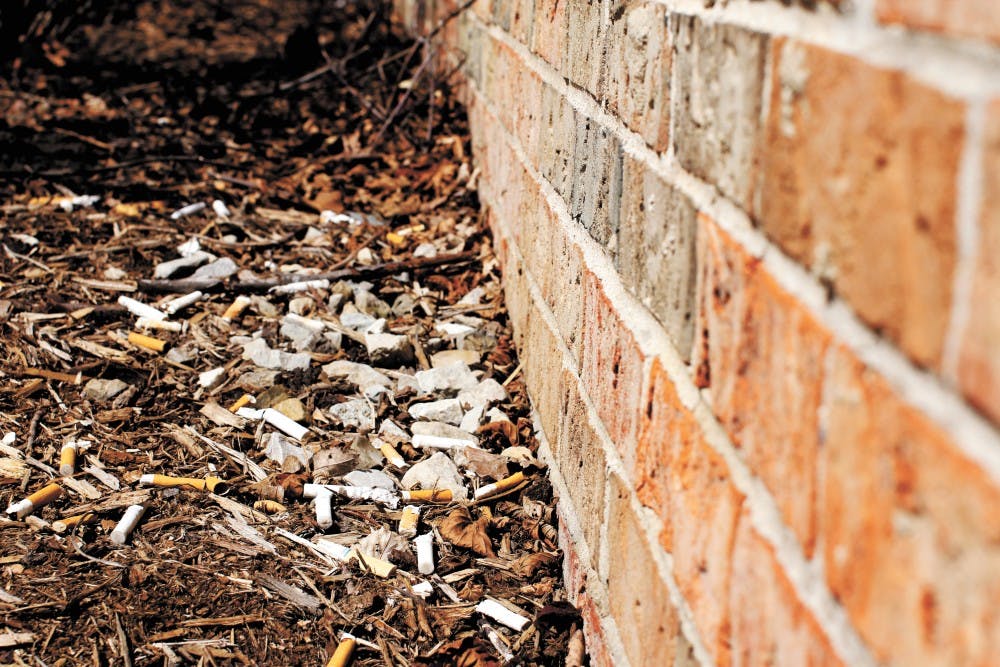Removal of ashtrays a cause of more litter
As warmer weather clears away the snow that once covered grass, Steve Kwarsick said the first thing he saw on campus was about six pieces of trash within twenty feet of him.
The Royal Oak sophomore said since the smoking ban was revised and in effect July 1, 2014 requiring ashtrays to be removed from campus he has seen an increase in littering.
"People are still going to smoke on campus. The issue now is they don't have anywhere to put their cigarette butts," Kwarsick said.
According to the Tobacco-free Policy "CMU has enforced a smoke-free policy dating back to 1992." The policy was revised when the U.S. Department of Health and Human Services created the Tobacco-Free College Campus Initiative in 2012, with the goal of eliminating the use of tobacco on college campuses nation-wide.
Since the introduction of the smoking ban, more than 100 ashtrays have been removed from campus. Steve Lawrence, associate vice president of Facilities Management, said cigarette butts and drink cups are the most littered items.
"We still find cigarette butts on the ground, but not as many as before," Lawrence said.
The university employs a full-time staff of 15 groundskeepers and six to eight students during the academic year that pick up litter daily. Lawrence said campus is littered most during the weekends and after events.
Shelby Township freshman Nate Stefanko is a smoker and said the smoking ban doesn't stop him from smoking on campus. He said he puts his cigarette butts on the ground instead of the trash because he fears starting a trashcan fire.
"I heard about the ban and that is was completely not enforceable so theres no legit reason for me to stop," Stefanko said. "I feel like removing the ashtrays just makes a bigger mess, I mean look around here (cigarette butts) everywhere. What are we supposed to do?"
Port Huron junior and Student Environmental Alliance member Tony Guizar said he thinks areas around the library and parking lots are littered the most on campus.
"The university could organize more student volunteer clean ups. I would totally help clean up campus," he said.
Registered student organizations like SEA, Collegiate Advocates for the Rights of Marine Animals and Greek Life host volunteer events focused on cleaning up trash in the community. Take Back the Tap also advocates for the ban of disposable plastic water bottles on campus.
Kwarsick said no matter what ban is introduced to campus, littering will not be decreased unless it is in violation of the Student Code of Conduct and is enforced.
"There's a general apathy toward littering, like 'it's not going to effect me immediately, so I shouldn't care about it,'" he said. "The only way to reduce littering is to have more (enforcement) when they see students littering. That would immediately effect the individual."
Director of Student Conduct Tom Idema said there have been five students reported for violating the Tobacco-Free Policy. There have been no complaints received by Faculty Personnel Services in regards to the policy.
According to the Tobacco-Free Policy, the success of the policy depends on the thoughtfulness, consideration and cooperation of tobacco users and non-users.
Students found in violation of the policy can be reported the Office of Student Conduct which will take appropriate action. Faculty members found in violation can be reported to Human Resources or Faculty Personnel.
"I've walked to class and stood outside of buildings smoking and no one has ever said anything to me about it," Stefanko said. "My RA's smoke cigarettes, I didn't know there were consequences to smoking on campus. I feel like they wasted a lot of money on signs and stickers for nothing really."
Director of Public Relations Steve Smith said the goal of the policy isn't to get students in trouble.
"The policy is intended to support a healthy CMU environment, not punish those who use tobacco," Smith said.
Violation of the policy will result in sanctions like education and treatment, but may include disciplinary action. Violators may be subject to civil fines of $100 for the first violation and not more than $500 for the second or subsequent violation as provided by Michigan Public Act 198 as enforced by state and/or local health department.





